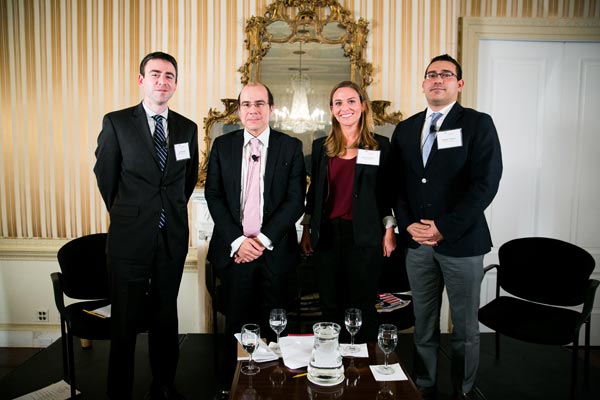Venezuela’s economic woes to continue: Panel
 |
|
From left, Jaime Reusche, vice-president and senior analyst at Moody's Investors Services, Francisco Rodriguez, senior Andean economist at Bank of America Merrill Lynch, moderator Katia Porzecanski of Bloomberg News, and Alejandro Velasco, assistant professor of Latin American studies at New York University, participated in a discussion on Venezuela's economy on Feb 3 in New York at the Americas Society/Council of the Americas. Provided to China Daily |
As low oil prices continue to slam Venezuela's economy, analysts said the country should consider raising the price of gasoline and electricity and pay more for imported goods.
A panel of economic analysts and a history professor reviewed Venezuela's deteriorating economy at a symposium sponsored by the Americas Society/Council of the Americas (AS/COA) on Feb 3 in New York.
Global oil prices, which were over $100 a barrel at one point last year, have fallen to under $50 a barrel. Even before crude prices collapsed, Venezuela's economy was reeling. Now high inflation (more than 60 percent) and chronic shortages of basic items are making life very difficult for Venezuelans.
"Venezuela produces oil and uses that to get everything they need. Venezuela's system of prices is unsustainable," said Francisco Rodriguez, senior Andean economist at Bank of America Merrill Lynch.
When oil prices were high, current President Nicolas Maduro and his predecessor, the late Hugo Chavez, used oil riches to subsidize the prices Venezuelans paid for items like gasoline and electricity. In 2014, there was a time when gasoline cost about 18 cents a gallon.
"The issue is Venezuela is running out of dollars. There may be a $40 billion funding gap this year. We think oil would have to be at about $90 a barrel for Venezuela to avoid default," said Jaime Reusche, vice- president and senior analyst at Moody's Investors Services. Last month Reusche's company downgraded the nation's debt rating to Caa3, the same level as conflict-ridden Ukraine.
Venezuelan benchmark sovereign bonds were trading at about 22 cents on the dollar in January, according to Christopher Sabatini, adjunct professor at Columbia University.
Bank of America Merrill Lynch's Rodriguez said he met with Finance Minister Rodolfo Marco Torres recently to discuss the country's economic problems. He doesn't think the Maduro government will allow a default. "If they default, it would be an admission of failure and they want to avoid that," Rodriguez said.
He told Torres that Venezuela must fix its price problem and will probably have to raise the cost of gasoline and electricity. Rodriguez said he couldn't comment on speculation that he, Rodriguez, may replace Torres as finance minister.
The Maduro administration is feeling the heat from the economic turmoil. "Maduro is polling at about a 20 percent approval rating," said Alejandro Velasco, assistant professor of Latin American history at New York University. "Still that doesn't translate into support for the opposition."
Part of that is due to a lack of a unified opposition, added Velasco. "People are experiencing this crisis relative to the past and to their standing in society. There is a sense of that we will rise up to overcome this," he said.
"Venezuela is not a socialist country. It's a petro state and the issue is a lack of attention to the petro state," Velasco added.
paulwelitzkin@chinadailyusa.com


















